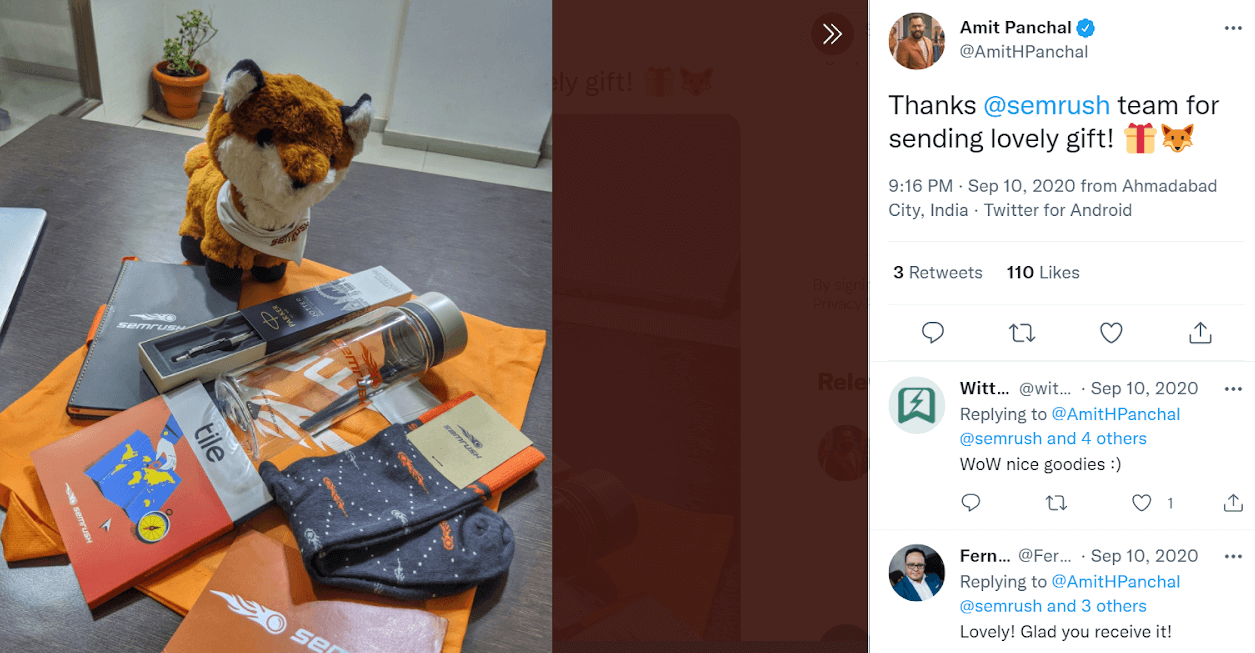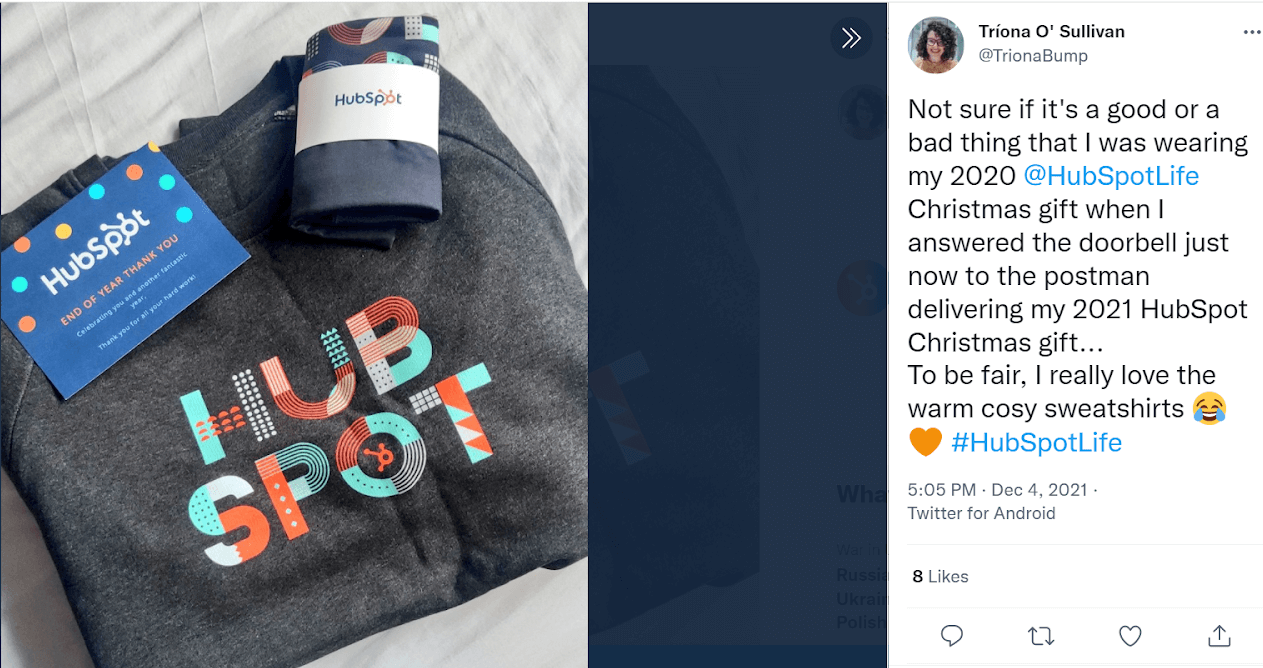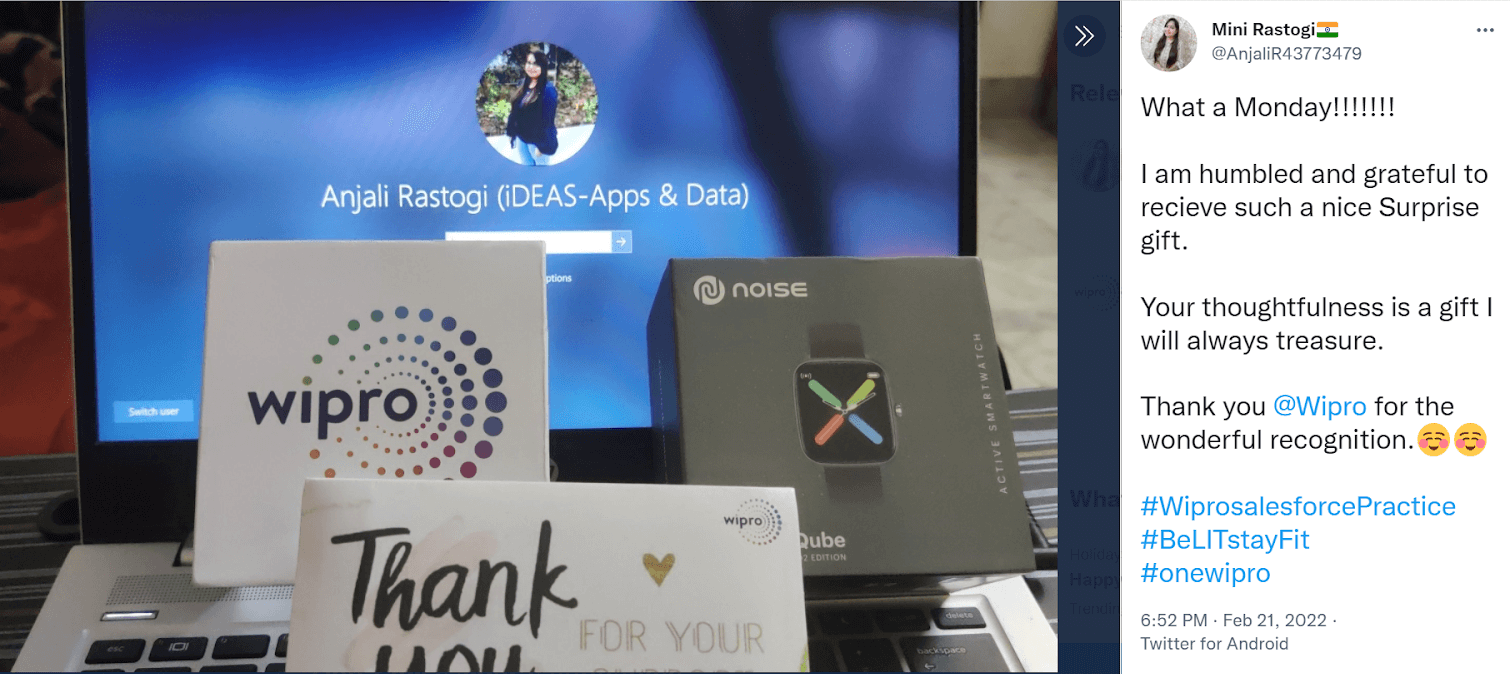Founders always ask "Should I build an audience before launch?" - **But without revenue, a startup dies. Focusing strictly on sales** may be your best strategy yet, and these tips will show you how. - **Looking for a powerful way to improve customer
Founders always ask "Should I build an audience before launch?"
-
But without revenue, a startup dies. Focusing strictly on sales may be your best strategy yet, and these tips will show you how.
-
Looking for a powerful way to improve customer churn and employee retention? Try corporate gifting! Check out the guide below on how to make it work.
-
Founder Slava Minamoto stuck to 3 new habits to help launch his SaaS. Here are the habits he used, and how you can implement them in your own schedule for increased productivity.
Want to share something with over 90,000 indie hackers? Submit a section for us to include in a future newsletter. —Channing
🤝 Focusing Strictly on Sales

by Steve Procter
One of the most asked questions among founders is: Should I build an audience before launching my startup?
I'm here to tell you that the answer is a big, fat no! Here's why.
The pattern
Think about this:
- An SEO guy told me that you need to get SEO right at the start.
- A web designer told me that my site needed redesigning.
- A Twitter expert told me that I must post heavily.
- A social ads expert told me that social ads work well.
- A YouTube influencer told me that I need a subscriber count.
Can you see the pattern? Let's apply this to founders.
Sales, sales, sales
The only thing that you need to focus on as an early-stage startup is sales. Pick up the phone and talk to potential clients. Emailing, DMing or arranging Zoom calls is fine, but the most effective way is direct one-on-one contact with buyers. No revenue = Startup death.
I've been a techie for 40 years, building startups for 25 of those years, and I know from bitter experience that focusing on direct outreach to potential clients works every time. I say this as someone who is not a salesperson and breaks out in cold sweats when preparing for sales campaigns.
It's likely to happen again as I prepare for calls for my new startup, Venture Cards, which is running a crowdfunding campaign. I know that the only way to get people to back me is to reach out and ask them. If I take the lazy way out and message my Twitter or LinkedIn followers en masse, many will simply reply with a thumbs up emoji, which is not at all useful for launching a business!
The template
The below examples of cold emails have worked very well for me in pushing my new startup. Here's why:
- I show off my experience, which helps open the door.
- I flatter them with "I recognize that you are a VIP in the industry."
- I do not give the web link, although it is in my email signature.
- I do not give the Calendly link until they've replied.
- Their only replies can be either "Bugger off!" or "Yes, please!" Keep it simple.
- I add a bit of intrigue. People love something that makes them curious.
The emails
The opener (cold email):
Hi Fred,
Your name has popped up, and I thought you'd be a good fit for something new I am working on. After 25 years of building my own tech startups, I am building a better way for founders and investors to connect. Can I send you a short outline? It could be interesting!
The email for landing market-fit discovery calls with investors:
Hi Fred,
Your name popped up earlier, and I thought you might be a good fit for something new I am working on. After 25 years of building my own tech startups, I am building a better way for founders and investors to connect. To help ensure I'm on the right track, I would welcome an opportunity to introduce the platform and get your valued feedback as an experienced industry player. Do you have 20 minutes for a Zoom call? It could be interesting!
Tip: Do not use my exact words. Use your own wording and speak as though from your own mouth. Otherwise, it will look like you copy pasted it from somewhere else (like an Indie Hackers post!). Recipients can tell if it's genuinely you.
What are your top tips for landing sales? Please share below!
Discuss this story.
📰 In the News

from the Volv newsletter by Priyanka Vazirani
🎙 YouTube is getting more serious about podcasts.
🪐 New discoveries hint at the possibility of life on Pluto.
🎮 PlayStation is finally getting a subscription gaming service.
📝 Amazon workers in NYC have voted to unionize.
💳 You’re eating a credit card’s worth of plastic every week.
Check out Volv for more 9-second news digests.
🎁 Corporate Gifting for Increased Loyalty and Retention

from the Techno Moghul newsletter by Sk Rafiqul Islam
Without employees, the work simply would not get done. Many founders put so much focus on customers that they overlook the employee side of things. You need to retain both your customers and employees. Here's how!
Corporate gifting
Let's start by stating the obvious: Providing great salaries and benefits to employees, and high quality products to customers, is the foundation to keeping folks happy on both sides. Next, you need to build upon that foundation.
Corporate gifting can help businesses sow the seeds of engagement and improve retention. Why?
1. It helps build long-term relationships:
Reaching out to your clients and employees with corporate gifts shows just how much you appreciate and respect them. It also helps you interact with your business partners in a way that is personal, responsive, and engaging.
Any company that rewards its employees and customers for their loyalty and contribution forges deep connections with them, which helps them stand out from companies that don't make an effort.
2. It shows care and appreciation:
Despite the fact that corporate gifting has been around for a long time, its power remains irreplaceable and highly impactful. Gift someone who goes out of their way to accomplish tasks, and it will inevitably build their loyalty and dedication towards you.
When the opportunity to renew contracts or switch companies presents itself, these moments of care and appreciation are ones that they will remember.
3. It promotes a positive work environment:
If you want to ensure employee retention, create a positive, connected work environment for employees to interact with colleagues and management. It inspires positive sentiment towards the workplace.
Tips for making corporate gifting work
Customize gifts: Personalize gifts. This could mean placing names on a laptop bag or water bottle, or sending out a gift hamper with their favorite items.
Gift on occasions like birthdays and festivals: This one’s obvious, but never gets old. Who doesn’t like to feel special on their birthday?
Send thoughtful gifts: Look beyond corporate t-shirts to find thoughtful products that will improve the aesthetics of the workplace, or please them enough to flaunt the item.
Give farewell and anniversary gifts: Celebrating work anniversaries by gifting employees with something special is a great way to express your appreciation for all of their hard work. And, although saying goodbye is difficult, you can ease the situation by providing a thoughtful parting present. Also, purchasing thoughtful farewell gifts for your staff means that they'll remember your firm even after they've left.
Focus on packaging for a great unboxing experience: The gift package's polish and presentation aid in communicating the thought process and meaning behind the gift.
Reward them for a job well done: A gift card for achieving a milestone, or a day off for putting in longer hours, goes a long way towards showing your appreciation towards employees. For customers and clients who have shown loyalty to your company, gourmet snacks or wellness gifts would be great.
Corporate gifting examples
Did you know that employees who receive gifts from companies share them on social media? Check out these examples of corporate gift ideas to get an idea for what you can gift your customers and employees.
- Gift box from SEMRUSH:

2. Sweatshirt from HUBSPOT:

3. Gift box from AHREFS:

4. Expensive gadget from Wipro:

Partner up with a reliable corporate gifting company to never miss an opportunity to reward and gift your employees and clients!
Do you practice corporate gifting? Share your experience below!
Discuss this story, or subscribe to the Techno Moghul newsletter for more.
🌐 Best Around the Web: Posts Submitted to Indie Hackers This Week

🏃♀️ Don't compare your progress with friends working in the corporate world. Posted by Jay.
🤷 Why so much hate for marketing? Posted by Jay Kalansooriya.
🧐 Is it hard to be hired again after indie hacking? Posted by Aydarmusin.
🛠 Share a link to your project. Posted by Ilya Novohatskyi.
🌄 Are you an early bird or a night owl? Posted by Mark.
💲 Selling dead startups. Posted by Jim Stefanakis.
Want a shout-out in next week's Best of Indie Hackers? Submit an article or link post on Indie Hackers whenever you come across something you think other indie hackers will enjoy.
⏰ Slava Minamoto's Three Effective Habits

by Slava Minamoto
Hi indie hackers! I'm Slava Minamoto, and I would like to share one of my failures. Here's how failure brought me to the world of productivity and habits, and how I used a couple of the most helpful habits when building my SaaS, My Good Week.
Failure to complete an MVP
Two years ago, I decided to pursue indie hacking. Living in Japan, I had the idea for a service that would allow users to keep a diary of hot springs (onsens) that they have visited, and share it with their friends. I assumed that I would finish the MVP within two months. I was wrong.
I vastly underestimated the time it would take me to complete this project. Three months passed, and I still had a lot of tasks yet to complete. Tasks like data entry about each hot spring took a lot of time. I avoided it for days and weeks, finding more technical features to implement instead.
Habits > Willpower
After more than half a year, I had to admit that I would not finish the project. I decided to stop and try to understand what I did wrong. I could not find any part of the work that I was not qualified to do, or any tasks that would not be possible to complete within this half a year. It must have been the way that I'd approached these tasks.
I went through dozens of business and productivity books, and tried various approaches. I realized that my reliance on willpower was a big problem. Willpower is a limited resource, and every time we push ourselves to start doing something, we deplete it. The harder we have to push ourselves, the more willpower we expend. The next thing we know, we are out of willpower completely.
Soon, I found that building a set of habits could help me start working on my project regularly and stress-free. My favorite books for habit building are The Power of Habit and Atomic Habits. Instead of paraphrasing these books, I will introduce specific practices and habits that I found helpful for working on my product.
Use a calendar to build habits
One key to building a habit is a "cue." It can be anything: A place, an object, or just another action. When the cue appears, you start doing your desired activity. For obvious habits, like brushing your teeth, it is easy to define a cue. For example, you may brush your teeth once you've finished drinking coffee.
But what about habits that move your project toward completion? I found it useful to use a calendar as a habit cue:
-
Use multiple calendars: You are probably already using your calendar for event planning or remembering birthdays. Create separate coloring and notification settings for each of your calendars. Using one calendar for everything will make it hard to separate your daily life, work, and side projects.
-
Set up notifications: This will be your cue.
-
Have a clear event title and description: When you get a notification, you should know what activity to start, and have everything ready to start immediately. Without a clear definition, the activity cannot become automatic.
Core habits to stick to
These core habits can become a foundation for turning any repetitive activity into a habit:
- Adjusting past calendar events: The calendar is not just about planning. It also lets you look back and understand exactly how much work you put in, and make some changes. Many calendar users skip it, but it is essential for weekly review and planning. The cue for this habit is the end of another activity. For example, you just finished writing a weekly blog post. Go back to the calendar and ensure that the timing you assigned for this task is correct.
- Weekly review: If done right, the weekly review will help you confirm that you did all you have planned, and find activities that you skipped or did not fully complete. Set up a calendar event for the weekly review.
- Weekly planning: Typically, weekly planning is done right after the weekly review is finished. The goal here is to use the insights you got from the review to adjust your plan for the next week.
The weekly review
How do you perform the weekly review? Go through each activity you have planned:
- Confirm that all activity events are the same as what happened in reality, and fix inconsistencies.
- Compare the number of hours you spent on each activity with your plan. For activities that did not go as planned, determine the reasons.
My Good Week can help with this by listing each activity and providing statistics for weekly, monthly, and quarterly reviews.
If you want to try this approach, link your Google Calendar to My Good Week in a couple of simple steps. Then, create an activity by choosing a calendar and a filter for events by name, description, or location. You will instantly get statistics about your activity with no additional data entry. It will keep updating in real-time, and you can come back and check your results next week.

Turn building a product into a set of habits
The three habits above make up a foundation for habit building, but how to employ it to work on your project? Any project at any stage can be split into many repetitive activities. Here are a couple of examples:
- Development: Daily development sessions, weekly testing of main functionality, etc.
- Analytics: Weekly metrics checking, monthly report publishing, etc.
- Content generation: Writing tweets daily, writing blog posts weekly, adding new plugins to a plugins catalog.
- Sales and customer relations: Answering client emails, consulting sessions, participating in events, etc.
You can come up with any number of activities that you consider essential for your project at the moment. Building habits is not about getting the best output every single day. It is about showing up every day and getting to work!
If you would like to learn more about productivity, habit-building, and how it applies to indie hacking, please consider signing up for my newsletter!
Discuss this story.
🐦 The Tweetmaster's Pick

by Tweetmaster Flex
I post the tweets indie hackers share the most. Here's today's pick:

🏁 Enjoy This Newsletter?
Forward it to a friend, and let them know they can subscribe here.
Also, you can submit a section for us to include in a future newsletter.
Special thanks to Jay Avery for editing this issue, to Gabriella Federico for the illustrations, and to Steve Procter, Priyanka Vazirani, Sk Rafiqul Islam, and Slava Minamoto for contributing posts. —Channing







